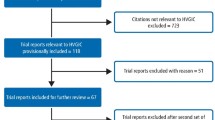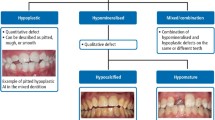Abstract
Data sources
The Cochrane Oral Health Group's Trials Register, the Cochrane Central Register of Controlled Trials (CENTRAL), Medline, Embase, and CINAHL databases were searched. Abstracts of the Conference Proceedings of the International Association for Dental Research and reference lists of identified articles were also scanned for relevant papers.
Study selection
Randomised trials where children and adolescents with AI who required restoration of teeth were allocated to different restoration techniques would have been selected.
Data extraction and synthesis
Standard Cochrane review protocols would have been followed.
Results
No studies met the inclusion criteria.
Conclusions
We found no randomised controlled trials of restorative treatments for children and adolescents with AI, and therefore there is no evidence as to which is the best restoration. Well defined randomised controlled trials which recruit children and adolescents and focus on the type and severity of the disorder should be undertaken to determine the best intervention for restoring teeth affected by AI.
Similar content being viewed by others
Commentary
Amelogenesis imperfecta (AI) is a term limited to inherited defects primarily affecting the enamel formation of the teeth. The prevalence is low and the clinical presentation and the severity varies.1 In some cases, few teeth are affected, in others nearly all are affected in both dentitions. Although AI only affects enamel formation, it has significant consequences for the affected patients. Often, AI patients experience sensitivity, difficulty in maintaining oral hygiene, decreased masticatory function and a lower self-esteem, affecting their over-all quality of life. The restoration of teeth is an important task for practitioners due to the variability of discomfort experienced, the patient's age, treatment options and the materials and techniques utilised.
The review suitably searched several databases for randomised clinical trials to match the inclusion criteria for comparing the different materials to use in patients with AI. The authors performed a systematic review following the Cochrane guidelines. After the protocol and the search were completed, the results indicated that no randomised clinical trials that matched the inclusion criteria were found.
Only one ongoing study is mentioned for consideration for a future update of the review. The authors concluded that there is a need for more randomised clinical trials addressing the topic presented, which is the same recommendation that many other reviews are concluding on different topics, an inference that has limited value for patients and practitioners as well.
With regard to the implications for research, the authors concluded that we need more research, suggesting for the future to carry out randomised clinical trials with an appropriate sample size and follow up that could give us relevant results to better determine the selection and the longevity of the restorations.
However, that task seems quite difficult due to the low prevalence of the disease, similar to many other dental conditions that are not numerous in worldwide populations. Oral health providers still need to be updated regularly on the techniques to restore function and aesthetics for all patients, with or without enamel defects. For those patients with AI diagnosis, the prognosis still remains uncertain; the expected longevity is dependent on several factors; the patient, the material being used and the practitioner's expertise.
References
Witkop CJ Jr . Amelogenesis imperfecta, dentinogenesis imperfecta and dentin dysplasia revisited: problems in classification. J Oral Pathol 1988; 17: 547–553.
Author information
Authors and Affiliations
Additional information
Address for correspondence: Cochrane Oral Health Group, School of Dentistry, The University of Manchester, Coupland 3 Building, Oxford Road, Manchester, M13 9PL, UK. E-mail: cohg@manchester.ac.uk
Dashash M, Yeung CA, Jamous I, Blinkhorn A. Interventions for the restorative care of amelogenesis imperfecta in children and adolescents. Cochrane Database Syst Rev 2013; 6: Art. No.: CD007157. DOI: 10.1002/14651858.CD007157.pub2.
This paper is based on a Cochrane Review published in the Cochrane Library 2013, issue 6 (see www.thecochranelibrary.com for information). Cochrane Reviews are regularly updated as new evidence emerges and in response to feedback, and the Cochrane Library should be consulted for the most recent version of the review.
Rights and permissions
About this article
Cite this article
Keenan, A. No trial evidence for restorative interventions in children and adolescents with amelogenesis imperfecta. Evid Based Dent 15, 45 (2014). https://doi.org/10.1038/sj.ebd.6401023
Published:
Issue Date:
DOI: https://doi.org/10.1038/sj.ebd.6401023



